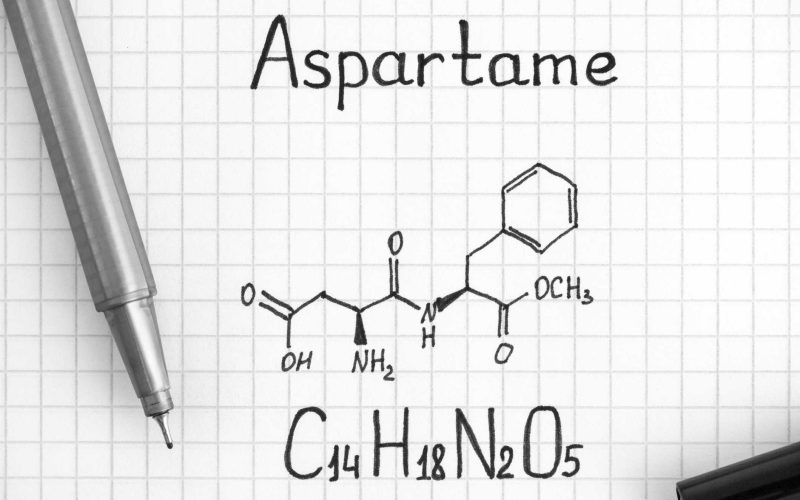Aspartame is an artificial sweetener used in many processed foods and drinks. This chemical is 200 times sweeter than sucrose (table sugar). It is one of the most popular artificial sweeteners.
It was accidentally discovered in 1965 by a chemist James Schlatter (.pdf). He discovered it when testing an anti-ulcer drug. In 1981, it was approved for dry goods, and in 1983 it was approved for carbonated beverages.
Less of it is used in used in sweetening a large amount of food or drink. It has been in used since the early 1980s. Aspartame has other names in different brands. It is called NutraSweet®, Spoonful® and Equal®.
In recent years, a lot of controversy came out about aspartame. They linked it to a lot of health problems including brain damage and cancer. A lot of studies and findings are proving this to be true.
A lot of health experts have called aspartame the “most dangerous substance” added to foods today. Prior to its approval for use in 1981, it was originally approved for use on dry goods in 1974.
But scientist and neuroscience researcher Dr. John W. Olney and James Turner, a consumer attorney, and others filed objections against this. They cited possible health dangers of aspartame and this forced the FDA to put its approval on hold.
However, it was later approved and to this day, aspartame is present in lots of commercially prepared foods and foods. Studies have revealed that over 75% of the adverse reaction to food additives are caused by aspartame.
Some of these reactions are serious. They include seizures and death. There are many documented symptoms of aspartame dangers and this is what this post focuses on.
The Composition of Aspartame
Three chemicals make up aspartame. They are aspartic acid, methanol, and phenylalanine. In natural health, aspartame is regarded as a “chemical poison”. Phenylalanine is 50% of aspartame.
Aspartic acid is 40% of aspartame and there are reports of damages caused by excessive ingestion of aspartic acids. Even glutamic acid which is 99% of monosodium glutamate is dangerous.
Together with aspartic acid, they cause a lot of acute syndromes and neurological disorders. Some common health problems linked to aspartame are:
- Tinnitus
- Heart palpitations
- Irritability
- Muscle spasms
- Migraines/headaches
- Weight gain
- Dizziness
- Difficulty breathing
- Vertigo
- Tachycardia
- Memory loss
- Panic attacks
- Insomnia
- Seizures
- Joint pains
- Rashes
- Slurred speech
- Depression
- Nausea
- Vision problems
- Loss of the sense of taste
- Hearing loss
- Numbness
- Fatigue
Health Complications Caused by Aspartame in Foods and Drinks
Brain damage
Aspartame and glutamic acid in your body affect your brain. They kill a good amount of neurons and this will allow the entry of excess calcium into your brain cells.
The high influx of calcium will promote excessive production of free radicals and this would affect your brain cells. The neural damage caused by aspartame and glutamic acid is why they are called excititoxin.
This is because they stimulate or excite your neural cells to death. The blood brain barrier which protects your brain from toxins like aspartame and excess glutamate can be affected by certain factors and this will enhance the entry of toxins into the brain.
When this happens, these toxins can start destroying your neurons slowly. Studies have shown that 75% or more of your neurons are killed in a particular part of your brain before the onset of any clinical symptoms of a chronic disease.
Another way aspartame affect the brain is to cause memory loss. This is the most common complaint gotten from people suffering from aspartame toxicity.
Hyperexcitability
Excess amount of aspartic acid, another by-product of aspartame breakdown causes this condition. Aspartic acid is converted to glutamate. This compound is a neuron excititoxin that damages nerve cells.
When you continuously stimulate your neurons by consuming aspartame, they would die. This will lead to many degenerative diseases like Huntington disease.
Weight gain
Aspartame is used in diet foods and drinks because just a little of it is used to sweetened foods/drinks. Also, aspartame contains 4 calories per gram.
However, recent research did not find any evidence that this low-calorie sweetener can control weight. Some studies monitored participants that were given drinks containing low-calorie sweeteners like stevioside, sucralose, and aspartame.
There discovered that there was an increased link between the regular intake of these sweeteners and an increased body weight and waist circumference.
In some studies, these participants had a high BMI. This made them prone to the development of metabolic diseases.
Another review revealed that people who take in natural sweeteners regularly have higher risks of chronic diseases like stroke, diabetes, and heart disease.
Menthol poisoning
Menthol is another by-product gotten when aspartame breaks down in the body. Excess menthol in the body causes menthol poisoning. This compound depresses your central nervous system.
This would lead to vision problems, brain toxicity and so on. Menthol also breaks down into formaldehyde and this is a deadly neurotoxin. It is a poison to the human body.
Aspartame is the largest dietary source of menthol.
Increases appetite
Aspartame increases appetite in people who take it. This is one of the ways it contributes to weight gain. This will make people eat large quantities of food.
Other artificial and non-nutritive sweeteners also act in this same way. Studies have linked regular intake of aspartame and other artificial sweeteners to regular intake of foods.
These sweeteners increase appetite by causing a disruption in the signalling process when someone eats food that take place when someone eats food with more calories.
Sweet taste signals your body and let it know that food is entering your gut. Your body expects to receive calories in this process. Then it signals you when you should stop eating by making you feel satiated or full.
When you take artificial sweeteners like aspartame, your body experiences the same process but gets fewer or no calories at all. If this happens all the time, the body unlearns the natural process.
This means that the link between sweet taste and calories would be disconnected. This, in turn, would lead to overeating because high calories foods will no longer trigger satiety.
Headaches and migraines
Studies have linked aspartame to headaches and migraines. This is due to the toxic overload of the by-products of aspartame. Excess of these in your body would disturb metabolism, dehydrate you, and accumulate in your body.
This, in turn, causes headaches and migraines.
Affects metabolism
The same way aspartame disrupts appetite, that’s the same way it disrupts metabolism. Regular intake of aspartame increases your risks of certain metabolic diseases like type II diabetes.
This happens because the body no longer expects calorie intake when you take in sweet things. So it becomes ill-equipped to handle dietary sugars when they are in the gut.
The long term intake of aspartame and other artificial sweeteners will affect the balance of helpful bacteria in your gut. This would lead to glucose intolerance. This is a risk factor for type II diabetes.
Studies have stated that increased use of aspartame increases one’s risks of glucose tolerance. Overweight individuals who take aspartame are more prone to glucose intolerance.
They come down with diabetes quickly than people with healthy weight.
Depression
Studies have revealed that excess phenylalanine, one of the by-products gotten from the breakdown of aspartame in the body causes depression.
It reduces the levels of dopamine and serotonin in the brain. These are the neurotransmitters responsible for motivation and happiness respectively.
Dopamine also controls movement and cognitions and it is also involved in the sensation of pleasure. Low levels of serotonin and dopamine causes depression.
Promotes cancer
In studies, aspartame had increased liver and lung cancer in mice. The higher the aspartame consumed, the higher the risks of cancer. Scientists believe that these too can happen in the human body when aspartame is taken regularly.
Parkinson’s disease
Dopamine controls the movement of muscles. Reduced amount of dopamine caused by excess phenylalanine can lead to loss of motor skills and muscle control.
Susceptible Individuals Should Avoid Aspartame
Individuals who are more susceptible to the damages caused by aspartame are pregnant women, little children, aged people, and individuals with chronic diseases and compromised immune systems.
They affect this class of people more. Some scientists include the women of child-bearing age in this class.
Some chronic diseases that have been linked to long-term exposure of excitatory amino acids are:
- Neuroendocrine disorders
- Brain lesions
- Dementia
- AIDS
- Hypoglycaemia
- Parkinson’s disease
- Alzheimer’s disease
- Epilepsy
- Hormonal problems
- Memory loss
- ALS
- Multiple sclerosis
Commercials Foods and Drinks Containing Aspartame
Almost all commercial foods and drinks contain aspartame. Even those labelled “sugar-free” contain either aspartame or some form of artificial sweeteners.
The following products contain aspartame:
- Gums
- Table-top sweeteners
- Diet soda
- Shake mixes
- Topping mixes
- Juice beverages
- Reduced-calorie fruit juices
- Instant teas and coffees
- Low-calorie yogurt
- Sugar-free candy and ice cream
- Instant breakfasts
- Breath mints
- Cereals
- Milk drinks
- Sugar-free chewing gum
- Cocoa mixes
- Coffee beverages
- Gelatin desserts
- Laxatives Yogurt
- Multivitamins
- Tea beverages
- Soft drinks
- Wine coolers
- Pharmaceuticals and supplements. Some drugs also contain aspartame, e.g. anti-malaria drugs, chewable vitamin supplements, and laxatives. And many over-the-counter medicines.
Healthy Alternatives to Sugar and Aspartame
Healthy things that can be used in place of refined sugar and aspartame are:
- Stevia leaves
- Molasses
- Agave nectar
- Maple syrup and
- Honey
Sources and References;
- Dietary methanol and autism; SD
- Diet studies; 2007
- Nonnutritive sweeteners and cardiometabolic health; cmaj
- Artificial sweeteners produce the counterintuitive effect of inducing metabolic derangements; Trends
- Reshaping the gut microbiota: Impact of low calorie sweeteners and the link to insulin resistance?; SD
- Aspartame intake is associated with greater glucose intolerance in individuals with obesity; CSP
- Side-Effects of Aspartame on the Brain; NF
- Aspartame Side Effects; Dr. Hull
- The sneaky story of how aspartame became legal; TYB
- Aspartame articles; Dr. Mercola







